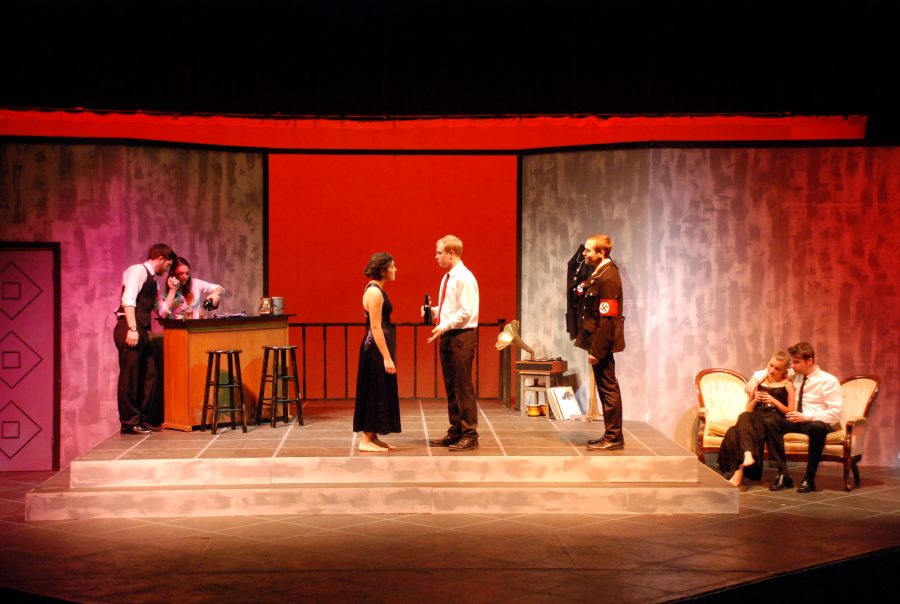Loyola’s own Poisoned Cup Players came in strong once again with their take on Every Year At Carnival by Jan Hartman, a provocative and chilling story about a German refugee and ex-Nazi soldier who wrestles with his inner demons. Taking place in Latin America, the Players successfully brought the suave feel of Latin America to our Loyola stage.
The first compliment should be given to director, Melanie Megale (‘14) who showed powerful character-blocking with dramatic entrances and wise use of the entire space of McManus. The play opens with Nazi soldiers entering from the back of the theatre, taking the audience completely by surprise and adding a sense of involvement between the cast members and the audience. Another great example of this was the constant movement; never once was there a dull moment. During the play, couples were dancing in the background or our beloved bartender (played by Olivia Calamia ’17) was slugging drinks behind a heart to heart between two lovers.
Also deserving praise is the exceptionally well-executed job done by lighting designer Rachel Fraczkowski (’14) and stage manager Adriana Tringone (‘14). The lighting and timing throughout the production was nothing short of impressive; with the amount of movement taking place on stage, the two seniors managed to artfully direct the audience’s attention with spotlights. Using different colors and brightness features, we were taken into a completely different world where light and darkness were used to create the dark and sexy tones of the play.
Lastly I’d like to congratulate the set and costume designers, Claudio Silva (‘14) and Elaine Cilley (‘15), who both utilized a certain simplicity which matched the characters’ personalities and stories. The technical as well as creative aspects were equally impressive.
Moving on to the acting, it was almost impossible to take your eyes off of anything happening onstage due to a colorful array of characters, played extremely well by the entire cast, starting with Hans Kleinmann played by Justin Thomas (’15). Justin played this tortured soul in an effortless way and seemed to really embrace the character of Hans, as you could feel his desire to please and obey command while still holding onto values he knows to be true, even if they’re incompatible with the ideologies of Nazi Germany. One of the stronger scenes included one that, though short, exemplified the strong acting ability of Thomas as well as an emotional performance given by Brian Lojewski (’14) in his portrayal as defiant soldier Erik Franck. Both men, after realizing where their alliances differ, are struck with pain and pity for each other; Erik pities Hans who will never have a spine, and Hans pities Erik as he sees the demise of his old friend, both men saddened by the obvious end of a friendship. With the once again superb touch of lighting the scene was set very stage left, yet was impossible to miss. It was both powerful and chilling as both actors were focused and committed to their characters.
Additions to this great duo included the very confident and seductive roles of Franco and Maribar, played by Mark Hahn (‘14) and Patrick Kammerer (‘14), who led the cast in wooing women and knowing how to have a good time. One thing that should be noted is both actors’ ability to transform from suave Latino men to cold soldiers in the Nazi army. Playing two roles, both Hahn and Kammerer impressed the crowd bringing the provocative roles of Franco and Maribar to life and then transitioning into Nazi soldiers Peter Reiner and Sergeant Zuckerman at the side of Erik and Hans.
As for the remaining cast, there were exceptional performances by Marilena Orfanos (’16) and Alexandra Chouinard (’17) who, playing Melinda and Maya respectively, delighted the stage with sultry and provocative roles. Rebecca Heemann (’14) also contributed greatly to the show as Constance, the timid love interest of Hans who painfully turns her back on him and his new ways and falls for his enemy, a Jew. Mark Massaro (’17) and Frank Finley (’15) also give great performances as the Clown and The Jew, evoking the gruesome truths of the times.
All in all, Every Year at Carnival proved to be a hit. With the strong forces of everyone involved, the production went smoothly and kept the undivided attention of its attendees. The cast successfully brought us back to a time where strong bonds were broken and people made choices, some of which they would regret for the rest of their lives. The tragic story of Hans’ conscience is something we were invited to experience during this performance, and it’s something that will definitely left the audience thinking.








































































































